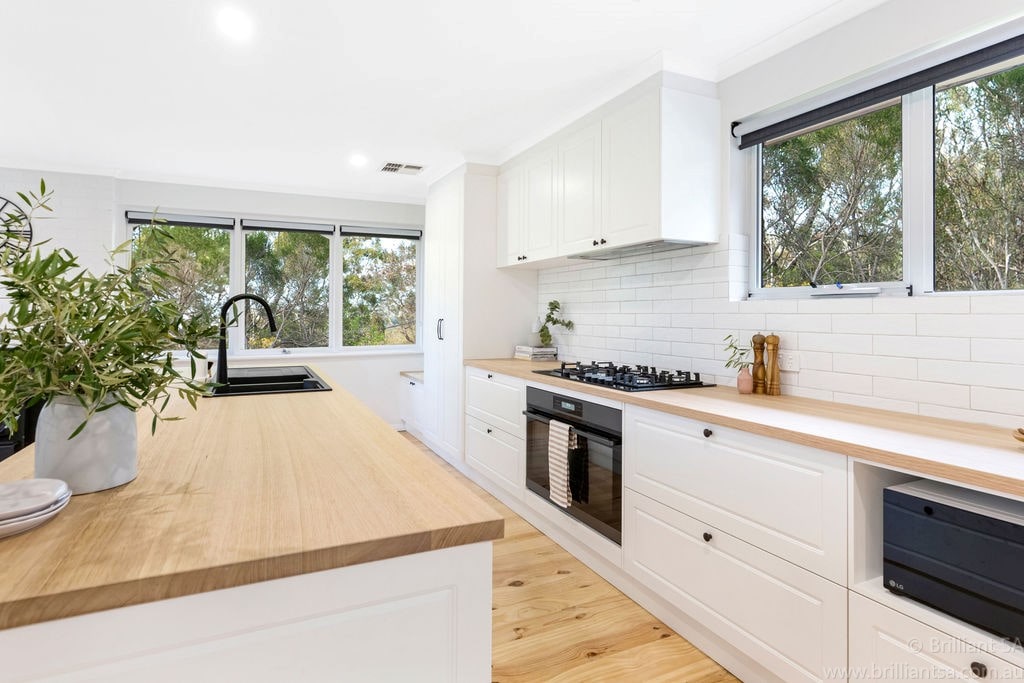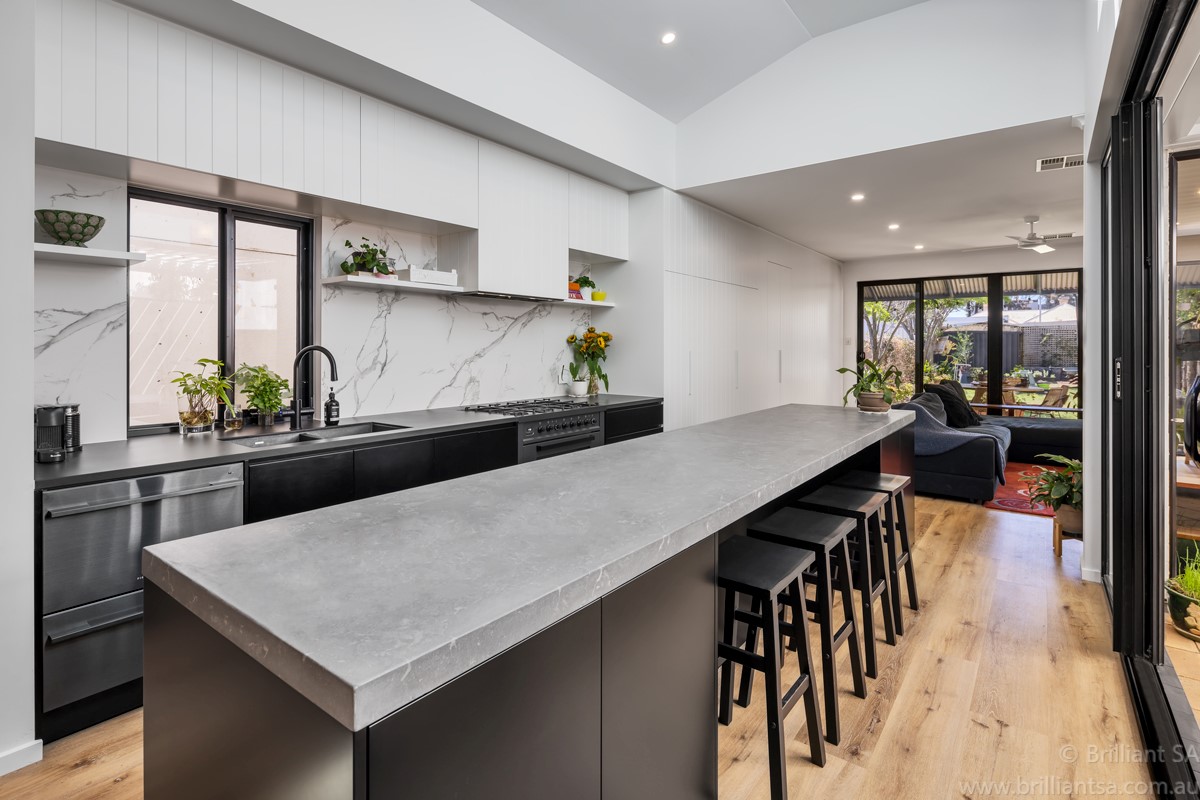Select Kitchen Benchtops That Unite Durability with Attractive Aesthetics.
Select Kitchen Benchtops That Unite Durability with Attractive Aesthetics.
Blog Article
Crucial Tips for Keeping Your Kitchen Benchtops for Resilient Beauty
Preserving the appeal and durability of your cooking area benchtops requires a thoughtful technique to care and cleaning. Normal maintenance techniques, such as making use of mild cleansing remedies and safety steps, can substantially extend the life of these surface areas. It's vital to understand which products can maintain their honesty while preventing damage. Furthermore, resolving spills quickly and using easy safety techniques can make a noticeable difference. With different materials and surfaces available, the right techniques might vary-- exploring these nuances might expose unanticipated insights for your kitchen care routine.
Normal Cleaning Up Practices
Maintaining a pristine kitchen area benchtop starts with carrying out regular cleaning methods. This straightforward technique not just maintains the benchtop looking fresh yet also decreases the risk of contamination.
In addition to everyday maintenance, an once a week deep clean is recommended. During this process, consider making use of an extra comprehensive service, such as a gentle multi-surface cleaner, to tackle any persistent spots or residues. For materials like granite or quartz, it is very important to comply with producer referrals for cleaning products to protect their integrity.
Pay special interest to high-traffic locations where spills are a lot more likely to happen, and don't fail to remember to clean the edges and corners where dirt can accumulate. Normal cleansing not only improves the durability of your cooking area benchtop but also makes sure a safe and inviting cooking environment. By creating these behaviors, homeowners can preserve the appeal and functionality of their cooking area surface areas gradually.
Preventing Harsh Chemicals
When it concerns cleaning kitchen benchtops, picking the right cleansing products is critical (Kitchen Benchtops). The long life and aesthetic charm of your benchtops can be dramatically endangered by the use of severe chemicals. Several traditional cleaner consist of abrasive substances that can scrape and dull surfaces, bring about undesirable marks and a reduction in their general life-span
In addition, harsh chemicals can react adversely with specific products, such as natural stones or crafted surfaces, possibly causing discoloration or destruction. For example, acidic cleaners can wear down the coating of granite or marble, while bleach can damage artificial surface areas. Consequently, it is necessary to go with pH-balanced, gentle cleansing solutions that properly get rid of dust and stains without risking injury to your benchtops.
In addition, many environment-friendly items are readily available on the marketplace, which not only supply safe cleansing choices but additionally add to a much healthier cooking area setting. If you choose a DIY technique, a combination of warm water and light soap can be highly effective (Kitchen Benchtops). By staying clear of severe chemicals, you can preserve the charm and integrity of your kitchen area benchtops for years to come
Using Cutting Boards
Utilizing Learn More Here reducing boards is necessary for securing your kitchen benchtops from square one and damage while preparing food. These boards serve as a barrier in between your knives and the surface of your benchtops, substantially minimizing the threat of unwanted marks and wear. It is advisable to utilize a cutting board made from materials such as wood, bamboo, or plastic, as each deals unique benefits.
Wooden cutting boards are recognized for their toughness and knife-friendly residential properties; they can Read More Here aid keep your knives sharp. Bamboo boards are an eco-friendly option that is lightweight and immune to knife scars. Plastic cutting boards, on the other hand, are simple to clean and often dish washer risk-free, making them a functional option for everyday use.

Sealing and Safeguarding Surfaces
Protecting your kitchen area benchtops expands past using cutting boards; sealing the surfaces plays a pivotal duty in protecting versus spots, wetness, and use. The right sealant can improve the sturdiness of materials, such as granite, quartz, and timber, guaranteeing they preserve their visual allure with time.

Application of the sealant need to be executed in a tidy, completely dry environment, complying with the manufacturer's guidelines for optimal outcomes. Typically, this entails cleaning the surface area extensively, using the sealant uniformly, and permitting it to heal as suggested. Regular upkeep, consisting of resealing every 1-3 years relying on usage and material, will certainly strengthen defense and lengthen the life of your benchtops, ensuring they continue to be a sensational focal point in your cooking area.
Attending To Spots Immediately
Discolorations on kitchen benchtops can rapidly come to be a substantial problem otherwise dealt with immediately. The longer a stain remains, the harder it becomes to remove, potentially causing irreversible discoloration and damage to the surface area. Consequently, it is important to deal with spills and discolorations as soon as they happen.
Various products call for certain methods to tarnish elimination. Non-porous surface areas like quartz can typically be cleaned up with light soap and water, while permeable materials, such as natural rock, might require specific cleaners to stop fluid penetration. Constantly refer to the producer's standards for the very best cleaning techniques.

Routine upkeep, consisting of securing permeable surfaces, can considerably minimize the risk of staining. By immediately addressing spills and understanding the certain demands of your benchtop material, you can maintain the aesthetic allure and capability of your cooking area surfaces for several years ahead.
Final Thought
To conclude, keeping the appeal and performance of kitchen area benchtops needs adherence to crucial cleaning methods, avoidance of severe chemicals, and using safety steps such as cutting boards. Routine securing of permeable products and prompt attention to spills and stains are important for protecting the stability of surface areas. By executing these methods, the longevity and aesthetic allure of kitchen area benchtops can be considerably boosted, making certain a beautiful and sturdy cooking setting.
Report this page